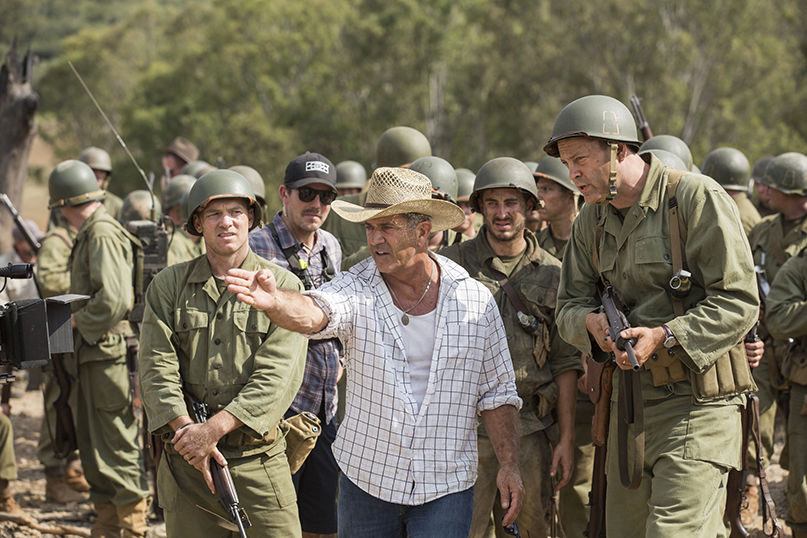When World War II Army medic Desmond Doss prayed, “Lord, let me get one more,” he wasn’t asking God to help him take an enemy’s life, but rather to help him save the life of a fellow soldier. “Hacksaw Ridge,” Mel Gibson’s latest directorial effort, tells the incredible true story of how Doss, a Seventh Day Adventist who refused to handle a firearm even in the heat of battle, miraculously saw his prayers answered many times over.
The film comes in hot with an enthralling combat montage reminiscent of “Saving Private Ryan’s” opening intensity, before going back in time and introducing us to Doss (Andrew Garfield), a prayerful young man growing up in the foothills of Lynchburg, Virginia, who possesses a natural propensity for ministering to the physically wounded. His instinctual knack for medical care combined with his uneasiness regarding the American lives being lost in the ongoing war instills within Doss a sense of obligation to enlist in the Army as a medic, despite the protests of his father (Hugo Weaving), a complicated alcoholic who survived World War I and hates himself for it, and the concerns of his fiancée, Dorothy (Teresa Palmer), a delightful nurse at the local hospital.
The resistance Doss faces from his family pales in comparison to the initial backlash he attracts from his fellow soldiers and superior officers Sergeant Howell (Vince Vaughn) and Captain Glover (Sam Worthington), who are baffled by Doss’ insistence that he: never handle a rifle and refrain from participating in war on the Sabbath. But as Doss continues to display unbelievable courage in saving the lives of his fellow soldiers, even in the most dangerous zones --- where the enemy is fast approaching --- Doss’ enemies on his own side of the line slowly but surely become his greatest admirers.
Just as Doss’ ability to earn his fellow soldiers’ respect was a matter of time and patience, so was bringing his story to the big screen. It took producers David Permut and Bill Mechanic 16 years to make “Hacksaw Ridge” a reality, partly because the extremely humble Doss was tenuous about the idea of being portrayed as a hero, and partly due to logistics. But as audiences and Oscar voters alike are sure to find when it debuts in theaters nationwide Nov. 4, “Hacksaw Ridge” was well worth the wait.
“With films, I’ve always believed that it’s meant to be when it’s meant to be,” assesses Permut. “And the way this film came together, with everyone involved, is a miracle in and of itself.”
Indeed, the extraordinarily powerful final product is fueled by the sum of its parts. Say what you will about Gibson’s controversial, checkered past, but “Hacksaw Ridge” proves yet again that he sure can direct. Though the film clocks in at more than two hours, its brisk, focused pacing gives it the feel of a much shorter movie.
In typical Gibson fashion, no punches are held in the gore department, but the violence onscreen never feels gratuitous, but rather supports the horrific picture of war that Gibson is attempting to paint. And on the flip side of that coin, Gibson very artfully encapsulates the unshakeable faith and undying love that Doss infused into this hellish landscape. With the exception of a few shots that are a touch on-the-nose in presenting Doss as a Christ-like figure, Gibson’s take on Doss and the impact he had on his fellow soldiers packs a tremendously powerful punch.
“I wanted to highlight what it means for a man with conviction and faith, in the midst of the maelstrom that is war, to be able to hone his spirituality and achieve something higher, above war, above religion, above everything,” states Gibson. “[Doss] performs acts of love in the midst of hell. It’s not about religion so much as it is about faith, conviction and pure love, which I think is at the heart of God. This isn’t a ‘war story’ so much as it is a ‘love story.’”
And Gibson’s deft directorial touch is complemented nicely by an outstanding cast. Palmer, Weaving, Worthington and Luke Bracey (all either Australian or British actors playing convincing Americans) have a lasting impact on the proceedings in their supporting roles. Even Vince Vaughn, known primarily for his motormouth comedic characters, enjoys his most successful dip into the dramatic pool yet with his portrayal of Doss’ no-nonsense drill sergeant. But the film belongs to Garfield, who turns in a tour de force performance that should, at the very least, put him in the conversation for “Best Actor” come Oscar time.
“It’s very rare you read a script that makes you say, ‘Oh God, I have to do this,’” says Garfield. In his attempt to capture the character of Doss, Garfield visited Doss’ property in Chattanooga, Tennessee, where Doss retired and passed away in 2003. And during his visit, Garfield found himself, much like Doss throughout his life, in a very prayerful state. “I went into his woodshed, held his tools, walked along the river where he used to walk,” explains Garfield. “And I spent the whole day praying to [Doss], saying, ‘Just guide me through this. Tell me what to do. Tell me how to speak. Tell me how to behave. And I’ll do whatever you say.’”
Apparently, Garfield got the message loud and clear, as Doss’ real-life children, upon viewing an early screening of the film, remarked, “That is my Dad!” of Garfield’s performance. And it’s a portrayal that, according to the film’s cast and crew, comes at a time when the world needs it the most.
“Desmond models an idea of masculinity that I think is very important, particularly in the time of Trump,” says screenwriter Robert Schenkkan, who co-penned the script with Andrew Knight. “It’s not about aggression. It’s not about dominating. It’s not about selfishness. It’s the antithesis of that. This film is about love and self-sacrifice. And in this political era, I can’t think of a more important message than that.”

